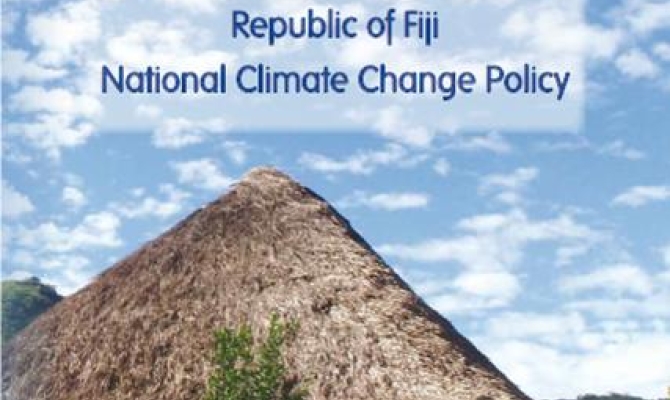
The recently launched National Climate Change Policy for Fiji will play a major role in strengthening the adaptation efforts of the Government of Fiji and its people. This work was also supported by the Pacific Adaptation to Climate Change (PACC) Project funded by the Global Environment Programme and the Australian Agency for International Development.
A Memorandum of Agreement between the PACC Fiji project implemented by the Land Water Resource Division of the Ministry of Primary Industries and the Department of Environment was signed on June 22, 2011 disbursing funds to the Department Environment for the development of the Climate Change Policy. The policy development was carried out in close collaboration with the Ministry of Foreign Affairs, now formally tasked with coordinating all climate change activities in Fiji. Further support for the policy work came from members of the National Climate Change (Country) Team.
"Before the NCCP was in place we faced challenges such as long processes in soliciting support from other government departments and the general lack of awareness and interest in climate change issues," said Assistant PACC National Coordinator Mr Waqanidrola from the Ministry of Primary Industries.
He added, "With  the policy, government has affirmed its commitment to supporting climate change projects such as PACC. We are hoping that this will result in more resources and technical support for PACC Fiji which will in the long run ensure the success of the project interventions planned to increase resilience to impacts of climate change."
the policy, government has affirmed its commitment to supporting climate change projects such as PACC. We are hoping that this will result in more resources and technical support for PACC Fiji which will in the long run ensure the success of the project interventions planned to increase resilience to impacts of climate change."
"Existing data, data collection and mechanisms for sharing with private and public section agencies were reviewed. Agency and community partnerships will be further developed and strengthened to raise awareness at community level through the empowerment of community based organisations."
The launch of the NCCP will strengthen the coordination and linkages of various adaptation projects being implemented at the national and community level at present in Fiji and ensure an effective communication mechanism between government and non government institutions and local communities on climate change issues is in place.
PACC Fiji will develop new drainage guidelines that take into consideration current and future changes in climate. This will assist in minimizing the vulnerability of lowland crops to the impacts of climate-related extremes such as flooding, soil erosion, and water-logging. The current drainage networks in lowland farming areas of Fiji can no longer cope with current rainfall and sea-level changes. As a result, flooding and inundation happen frequently leading to damage in valuable crops that the Fijian economy is dependent on. The pilot sites for the PACC project in Fiji are Tailevu-Rewa and Serua Namosi provinces (lower deltas).
PACC is implemented by the United Nations Development Programme in partnership with the Secretariat of the Pacific Regional Environment Programme. In Fiji, it is executed by the Land and Water Resource Management Unit of the Ministry of Primary Industries. It is funded by the Global Environment Facility and the Australian Agency for International Development.
PACC involves 14 Pacific Island Countries and Territories and aims to enhance countries' adaptive capacity in the sectors of Coastal Zone Management, Food Production and Food Security and Water Resource Management.
For more information, contact Mr Taito Nakalevu.